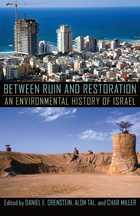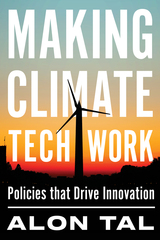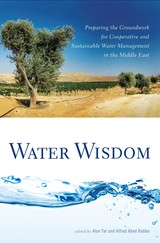3 books by Tal, Alon

Between Ruin and Restoration
An Environmental History of Israel
Daniel E. Orenstein
University of Pittsburgh Press, 2013
The environmental history of Israel is as intriguing and complex as the nation itself. Situated on a mere 8,630 square miles, bordered by the Mediterranean Sea and Persian Gulf, varying from desert to forest, Israel’s natural environment presents innumerable challenges to its growing population. The country’s conflicted past and present, diverse religions, and multitude of cultural influences powerfully affect the way Israelis imagine, question, and shape their environment. Zionism, from the late nineteenth onward, has tempered nearly every aspect of human existence. Scarcities of usable land and water coupled with border conflicts and regional hostilities have steeled Israeli’s survival instincts. As this volume demonstrates, these powerful dialectics continue to undergird environmental policy and practice in Israel today.
Between Ruin and Restoration assembles leading experts in policy, history, and activism to address Israel’s continuing environmental transformation from the biblical era to the present and beyond, with a particular focus on the past one hundred and fifty years. The chapters also reflect passionate public debates over meeting the needs of Israel’s population and preserving its natural resources.
The chapters detail the occupations of the Ottoman Empire and British colonialists in eighteenth and nineteenth century Palestine, as well as Fellaheen and pastoralist Bedouin tribes, and how they shaped much of the terrain that greeted early Zionist settlers. Following the rise of the Zionist movement, the rapid influx of immigrants and ensuing population growth put new demands on water supplies, pollution controls, sanitation, animal populations, rangelands and biodiversity, forestry, marine policy, and desertification. Additional chapters view environmental politics nationally and internationally, the environmental impact of Israel’s military, and considerations for present and future sustainability.
Between Ruin and Restoration assembles leading experts in policy, history, and activism to address Israel’s continuing environmental transformation from the biblical era to the present and beyond, with a particular focus on the past one hundred and fifty years. The chapters also reflect passionate public debates over meeting the needs of Israel’s population and preserving its natural resources.
The chapters detail the occupations of the Ottoman Empire and British colonialists in eighteenth and nineteenth century Palestine, as well as Fellaheen and pastoralist Bedouin tribes, and how they shaped much of the terrain that greeted early Zionist settlers. Following the rise of the Zionist movement, the rapid influx of immigrants and ensuing population growth put new demands on water supplies, pollution controls, sanitation, animal populations, rangelands and biodiversity, forestry, marine policy, and desertification. Additional chapters view environmental politics nationally and internationally, the environmental impact of Israel’s military, and considerations for present and future sustainability.
[more]

Making Climate Tech Work
Policies that Drive Innovation
Alon Tal
Island Press, 2024
Climate tech is critical for averting planetary chaos. Half the greenhouse gas reductions required to reach “net-zero” climate targets in 2050 will need to come from technologies that have not yet been invented. Without effective government interventions, market incentives alone will not produce a rapid transition to a low-carbon economy. The commercial value of innovative climate technology, especially in its early phases, remains underpriced—far below its social value. The good news is that smart policies can change these dynamics and catalyze the necessary creativity and investment in clean technology, and its deployment. The key question is: which approaches can lead us to future carbon neutrality, and which are likely to fall short?
In Making Climate Tech Work, environmental policy expert Alon Tal demystifies climate innovation programs around the world—no policy background needed. Beginning with a review of government’s general role in technology policy development, Tal assesses each policy alternative, describing eye-opening experiments in diverse countries, presenting a range of case studies, interviewing leading decarbonization experts, and interpreting new empirical data. Discover how Germany incentivized renewables; Denmark became a wind energy superpower; Australia phased out incandescent bulbs; California’s prisons pioneered low-carbon menus; and why carbon taxes have failed around the world—but could be designed for success.
Tal distills the benefits and drawbacks of each policy, along with related ethical questions and public perceptions. He concludes by addressing two commonly overlooked issues in climate policy: disruption of workers’ livelihoods from the clean energy transition; and integrating the Global South into the planet’s new low-carbon economy—as the region that has contributed least to climate change but which must be part of a global solution. Tal not only evaluates which policy strategies effectively reduce emissions but also how they can promote climate tech innovation.
Humanity is ultimately in a race against time and effective climate policies are critical to ensure a sustainable future. Making Climate Tech Work serves as an essential primer for policymakers, academics, activists, and anyone interested in climate solutions.
In Making Climate Tech Work, environmental policy expert Alon Tal demystifies climate innovation programs around the world—no policy background needed. Beginning with a review of government’s general role in technology policy development, Tal assesses each policy alternative, describing eye-opening experiments in diverse countries, presenting a range of case studies, interviewing leading decarbonization experts, and interpreting new empirical data. Discover how Germany incentivized renewables; Denmark became a wind energy superpower; Australia phased out incandescent bulbs; California’s prisons pioneered low-carbon menus; and why carbon taxes have failed around the world—but could be designed for success.
Tal distills the benefits and drawbacks of each policy, along with related ethical questions and public perceptions. He concludes by addressing two commonly overlooked issues in climate policy: disruption of workers’ livelihoods from the clean energy transition; and integrating the Global South into the planet’s new low-carbon economy—as the region that has contributed least to climate change but which must be part of a global solution. Tal not only evaluates which policy strategies effectively reduce emissions but also how they can promote climate tech innovation.
Humanity is ultimately in a race against time and effective climate policies are critical to ensure a sustainable future. Making Climate Tech Work serves as an essential primer for policymakers, academics, activists, and anyone interested in climate solutions.
[more]

Water Wisdom
Preparing the Groundwork for Cooperative and Sustainable Water Management in the Middle East
Abed Rabbo, Alfred
Rutgers University Press, 2010
Israel and Palestine are, by international criteria, water scarce. As the peace process continues amidst ongoing violence, water remains a political and environmental issue. Thirty leading Palestinian and Israeli activists, water scientists, politicians, and others met and worked together to develop a future vision for the sustainable shared management of water resources that is presented in Water Wisdom. Their essays explore the full range of scientific, political, social, and economic issues related to water use in the region; acknowledge areas of continuing controversy, from access rights to the Mountain Aquifer to utilization of waters from the Jordan River; and identify areas of agreement, disagreement, and options for resolution. Water Wisdom is model for those who believe that water conflict can be an opportunity for cooperation rather than violence.
[more]
READERS
Browse our collection.
PUBLISHERS
See BiblioVault's publisher services.
STUDENT SERVICES
Files for college accessibility offices.
UChicago Accessibility Resources
home | accessibility | search | about | contact us
BiblioVault ® 2001 - 2024
The University of Chicago Press









